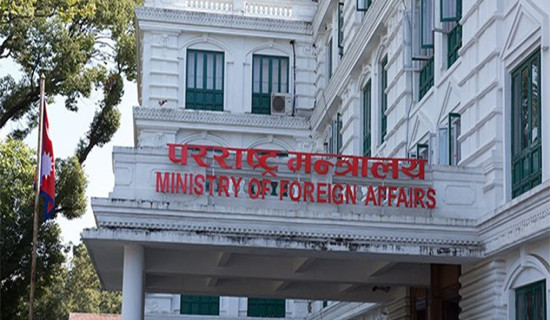- Tuesday, 3 March 2026
Government’s austerity measures expected to improve expenditure pattern
Kathmandu, Nov. 16: Within a couple of weeks of his assumption of the post of Finance Minister, Rameshore Prasad Khanal initiated a drive to apply austerity measures in all forms of public expenditure – development, operational and financing.
While this is a practice announced by various governments in the past but implemented very poorly, this transition government seems determined curbing the expenses that are adding burden to the state coffers.
"The Ministry is earnestly implementing the newly announced budget control measures to improve fiscal responsibility and ensure efficiency in public fund mobilisation," said Tanka Prasad Pandey, Spokesperson of the MoF.
According to him, scrapping of small-scale, redundant and scattered projects will help in generating Rs. 120 billion. However, it will take a while to estimate the actual financial savings made through the control measures applied in recurrent expenditure.
Speaking at a programme in Kathmandu on Thursday, FM Khanal said that more than 1,000 security personnel and 30 vehicles were returned by the pervious office holders who were availing of the facilities beyond legal provisions. He expressed his commitment to implementing fiscal discipline and supporting the private sector through various incentives.
Through a directive, the Ministry of Finance (MoF) decided to suspend projects without preparatory works, that have duplicate entries, and that are outside the core objectives of the respective agency. Through the scrapping of more than 1,200 piecemeal projects, the government said to had saved about Rs. 120 billion. The Ministry of Physical Infrastructure and Transport is leading this drive.
All small and low-priority projects will be transferred to provincial or local governments while no multi-year funding approval will be granted for newly listed projects or procurement purposes entered in the current Fiscal Year 2025/26. The Finance Ministry also made a move not to implement projects costing above Rs. 1 million through consumer committees, while also checking the practice of splitting projects into small units with an aim to implement them through such committees.
In terms of recurrent expenditure, allocated funds were suspended from the programmes with unclear operational modality and unguaranteed outcomes and comprising unproductive activities. There will be no meeting allowances for regular work, except for committees formed in accordance with the law. The directive also barred the government agencies from outsourcing consultants for the tasks that can be performed internally, and also from buying new equipment and materials as far as possible.
It scrapped the practice of appointing advisors and personal secretaries except for big-five ministers. Most of the foreign visits were also suspended.
The Finance Ministry said that need and justification for advisors and personal secretaries, while the availability of the latter has discouraged the office-bearers from studying and understanding matters themselves. "Some personal secretaries have emerged as intermediaries as well," it said.
Suman Dahal, Joint Secretary and Chief of Budget Division at the MoF, had earlier said that the provisions were implemented to ensure that ongoing, nationally significant and strategic projects—initiated with prior approval of funding sources—do not face budget shortages.
According to him, since the present government has a mandate until the next election, slated for March 5 next year – it doesn't want to create long-term liabilities. "With the scrapping of sick projects and contracts, a large amount of funds has now been at the disposal of the government," he had said following the announcement of the directive.
The MoF said that the scrapped projects and programmes were incorporated in the budget based on political influence, pressure and connections rather than clear identification. They were also identified without maintaining regional balance.
The directive has also eliminated the trend of holding unnecessary meetings simply to claim allowances even for regular work, and hiring consultants for routine tasks. Allowances can still be given for meetings held outside of office hours for legally established committees.
A requisite reform
As a former Secretary of Finance who resigned from the post in March 2011, on the pretext of impunity to about 450 business firms that did not pay the Value Added Tax (VAT) or that fraudulently claimed excess VAT refund, FM Khanal's move was expected.
He was also critical of the supplementary budget that then Finance Minister Bharat Mohan Adhikari wanted to bring about. Khanal’s reason was: cheating on VAT and moving to announce a supplementary budget were against fiscal discipline and counterproductive to the national economy.
Khanal has the advantage of not being among the political leaders from various levels and under the pressure to allocate budgets to politically-motivated projects and programmes, many of which were used as an instrument to win an election. Finance ministers like Dr. Yuba Raj Khatiwada, Dr. Prakash Sharan Mahat and Surendra Pandey couldn't fully implement their visions on economic reforms.
FM Bishnu Prasad Paudel had announced the control measures three years ago but it was limited to rhetoric only. It could bring no change.
The very political reasons and the finance ministers’ lack of desire hindered them from implementing the recommendations made by the Public Expenditure Review Commission, led by economist Dr. Dilli Raj Khanal.
Then Minister for Urban Development Ram Kumari Jhakri had barred consumer committees from construction projects, saying that the construction work implemented by them was of low standard. But consumer committees prevailed even though the Commission for Investigation of Abuse of Authority (CIAA) questioned the quality of their work multiple times.
Positive but inadequate
Economist Dr. Khanal termed the government's move 'a positive initiative' but maintained that it’s inadequate and more should be done to maintain fiscal discipline.
"Nepal needs reforms in public expenditure as its public capital stock is in a downward trend since 1990, while government expenditure size is in a higher proportion in South Asia except India," he said.
He pointed to the need for project-level restructuring, stating that only strategic and urgent projects should be announced and implemented with calculation of input, output, outcome and impact, he said.
Dr. Khanal is particularly critical of various committees formed by the government and the mismanagement of funds and low productivity in public enterprises. "Without these actions, you can't make real reform sought by the youth through the Gen Z movement," he said.
'Provinces' autonomy is infringed'
Meanwhile, provinces have expressed their concerns that the federal government's directive shouldn't be forcefully implemented there. The provincial ministers for economic affairs have been arguing that provinces have the autonomy to make their own decisions, and if changes are needed in provincial laws, they must be amended accordingly.
Rewati Raman Bhandari and Prabhat Kumar Tamang, economic affairs ministers of Koshi and Bagmati, are particularly vocal about it. "Forcing the provincial governments to follow the federal decisions is unconstitutional and against the essence of federalism. This is an encroachment of our jurisdiction," said Minister Tamang, pointing to the need to scrap unnecessary federal agencies and structures.
The Bagmati government has recently formed a committee to look into administrative restructuring and is considering scrapping the councils that are irrelevant.
While FM Khanal said, during his visit to Biratnagar in September, that the federal government's decision did not nullify provincial laws, it could impose restrictions on how federal grants are used.
According to Dr. Khanal, on the pretext of rights to design and implement programmes, misconduct is on the rise at the subnational levels. It should be immediately checked.
But Minister Tamang remarked that the grants were set by the National Natural Resources and Fiscal Commission, and the provinces were receiving a small portion of the annual budget. "Seven provinces receive only about 10 per cent of the annual budget while 69 per cent is mobilised by the federal government," he said.
Earlier, in September, the Finance Ministry had said that the federal government can set standards and procedures for public expenditures. The Financial Procedures and Fiscal Responsibility Act, 2019, has authorised it to make necessary arrangements for regulating and systematising the economic procedures of the federal, provincial and local levels.
Section 24 of the Act authorises the MoF to prescribe expenditure standards to ensure uniformity and promote austerity, and all officials of government bodies are obliged to comply.
Likewise, Section 34 of the Intergovernmental Fiscal Arrangement Act, 2017 also authorises the federal government to issue directives to provincial and local levels on financial matters in order to regulate budgets, expenditure and maintain fiscal discipline.
Exporters want incentives to continue
The private sector has registered its strong objections to scrapping the incentives to businesses and exports, and expressed concerns about the implementation of the relief measures announced for the businesses affected by the Gen Z movement.
"Relief has been announced, but it’s yet to be implemented even after more than two months. Entrepreneurs should be provided with the support to boost their confidence," said Chandra Prasad Dhakal, President of the Federation of Nepal Chambers of Commerce and Industry (FNCCI).
Although the government has formally announced the scrapping of incentives on exports, entrepreneurs are hopeful of its resumption. "Actually, the subsidies on exports were brought to nominal by the previous government. However, since the finance minister, chief secretary and other ministers are positive, we are hopeful of availing the facility," said Pashupati Dev Pandey, President of Garment Association of Nepal.
According to him, if the government feels that the subsidies were misused, parameters should be revised to discourage such practice but products having above 30 per cent value addition should be entitled to export subsidies.
Pandey also suggested that if the government is short of funds, cash incentives can only be given to third-country exports.
Especially, in the wake of the reciprocal tariff promoted by the United States, producers should be incentivised since the production and transportation costs in Nepal is significantly high compared to other South Asian peers, according to the entrepreneurs.





-square-thumb.jpg)





-original-thumb.jpg)




